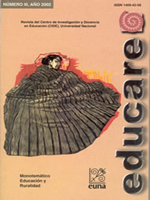La contextualización del currículo, un medio para potenciar el desarrollo
DOI:
https://doi.org/10.15359/ree.2002-3.10Abstract
The author describes the experience of taking into account the curriculum for the microcultural dimension (school) and the macrocultural dimension (community) in primary schools in Guápiles, Limón and Pérez Zeledón.
To achive this, she presents a theoretical framework based on D. Ausbel´s constructivist postulates. The use of portfolios as a tool for evaluation in also analyzed. The proposal has a holistic view orienting educational processes toward multidisciplinary and transdisciplinary approaches.
References
Aguilar, M. E. y Monge, M. E. (1994). Hacia una pedagogía rural María
Ester Aguilar y Marta Eugenia Monge, Heredia: ANDE.
Borsotti, C. ( 1984) Sociedad rural, educación y escuelo en Américo Latina. Buenos Aires: Kapeluz.
Camp, R. (1991) Porrfolio refiection in middle and secondary school
classrooms. The place of porrjolio in our changing views of writing assessment. Assessment in the context of schools and shool change. N. Jersey: Educational Testing Service. S .1: Inédito.
Colombia, Ministerio de Educación Nacional. (1991) Escuela de mostrativas y microcentros rurales. Bogotá: Ediciones Programas Escuela Nueva.
Costa Rica, Ministerio de Educación Pública. Depto. de Evaluación Educativa: Orientaciones teórico-prácticas para mejorar el proceso de evaluación de los aprendizajes. San José, C.R.: El Ministerio s.f.
Costa Rica, Ministerio de Educación Pública Español: I ciclo ( 1995).San José, C. R.: El Ministerio.
Costa Rica, Ministerio de Educación Pública Español: II ciclo ( 1995). San José, C. R.: El Ministerio.
DeZubería, J. y González, M. A. ( 1995) Estrategias metodológicas y criterios de evaluación. Bogotá: Fundación Alberto Merani.
DeZubería, M. (1995). Formación de valores y actitudes: un reto a las
escuelas de futuro. Bogotá: Fundación Alberto Merani.
DeZubería, M. (1994). Los modelos pedagógicos. Bogotá: Fundación Alberto Merani.
DeZubería, M. (1994) Pensamiento y aprendizaje: los instrumentos del
conocimiento. Bogotá: Fundación Alberto Merani.
DeZubería, M. y DeZubería Rojo, A. (1995). Operaciones intelectuales y creatividad. Bogotá: Fundación Alberto Merani, 1995.
García, J. y Jiménez K. Portafolio de evaluación. S.l., s.n., s.f.
Kaplún, M. (1984). El comunicador popular. Caracas, V.E.: CIESPAL.
Molina Bogantes, z. (1995). La contextualización del currículo: una estrategia para alcanzar la calidad y la equidad en la educación. San José, C.R.: Ministerio de Educacíón Pública.
Palmer Wolf, D. (1989). Portafolio assessment: sampling s1tudent work. Educational leardership. 46 (7), april, 35-39. S.I., s.n.
Programa UNIR (1997). Comentarios Académicos en Desarrollo Regional y Rural. Nº 3, agosto, UNA. EUNA.
Universidad Nacional (1991 ). Centro de Investigación y Docencia en Educación. División de Educación Rural: Plan de desarrollo académico 92-97. Heredia, C.R.: DER.
Vega Posada, R. ( 1998). Conferencia electrónica (POBREZA, COMUNIDADES CAMPESINAS Y DESARROLLO RURAL "GOBIERNOS LOCALES Y DESARROLLO RURAL EN LOS ANDES: CASOS Y EXPERIENCIAS", PUNO.
Published
How to Cite
Issue
Section
License
1. In case the submitted paper is accepted for publication, the author(s) FREELY, COSTLESS, EXCLUSIVELY AND FOR AN INDEFINITE TERM transfer copyrights and patrimonial rights to Universidad Nacional (UNA, Costa Rica). For more details check the Originality Statement and Copyright Transfer Agreement
2. REUTILIZATION RIGHTS: UNA authorizes authors to use, for any purpose (among them selfarchiving or autoarchiving) and to publish in the Internet in any electronic site, the paper´'s final version, both approved and published (post print), as long as it is done with a non commercial purpose, does not generate derivates without previous consentment and recognizes both publisher's name and authorship.
3. The submission and possible publication of the paper in the Educare Electronic Journal is ruled by the Journal’s editorial policies, the institutional rules of Universidad Nacional and the laws of the Republic of Costa Rica. Additionally, any possible difference of opinion or future dispute shall be settled in accordance with the mechanisms of Alternative Dispute Resolution and the Costa Rican Jurisdiction.
4. In all cases, it is understood that the opinions issued are those of the authors and do not necessarily reflect the position and opinion of Educare, CIDE or Universidad Nacional, Costa Rica. It is also understood that, in the exercise of academic freedom, the authors have carried out a rogorous scientific-academic process of research, reflection and argumentation thar lays within the thematic scope of interest of the Journal.
5. The papers published by Educare Electronic Journal use a Creative Commons License:














 The articles published by Educare Electronic Journal can be shared with a Creative Commons License:
The articles published by Educare Electronic Journal can be shared with a Creative Commons License: 



